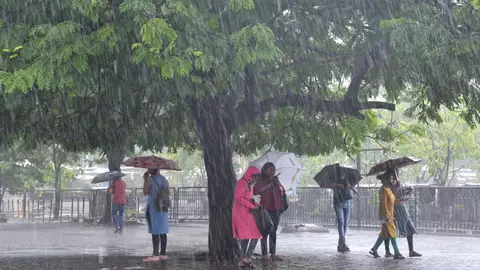Rama Krishna S
Timely onset of South-West (SW) monsoon in southern peninsula in general and Telangana and Andhra in particular has lifted hopes of bountiful harvest in this rice belt during the current Khariff season. The monsoon which entered Kerala close to three weeks ago finally set in over the Deccan plateau by June 14. The monsoon is expected to spread to the rest of the country by the end of July, almost on time.
Of the around 120 CM of average rainfall India receives in a year, 75 per cent pours down during this SW monsoon period of three to four months – between June and October. The rest are cyclones or storms.
This will have three significant consequences to people, as well as the governments. First, the SW monsoon which accounts for 60 per cent of India’s agricultural production will ensure bumper crops, both food and commercial ones this year too. As a result, there will be enough food grains with the Food Corporation of India and the states too. All ongoing food subsidy schemes can go on uninterruptedly.
Second impact will be non-escalation of tensions among different states over river water disputes. Telangana and Andhra fight over Krishna and Godavari waters, while Tamil Nadu and Karnataka quarrel over River Kaveri. So is the case with Tamil Nadu and Kerala over some small rivers and reservoirs. The Centre is unable to solve these disputes and left them to the judicial tribunals. Timely rains will not lead to bitter fights among the states.
Third and most important salutary effect of timely rains is moderate food prices. Reserve Bank of India has been struggling to bring down the inflation, particularly the food prices under control, to below 6 per cent. If monsoon yields normal rains, even Met officials say so, the food prices will come down by a per cent, from the present inflation rate of around 7.5 per cent.
The Centre has set a target of 32.80 crore tonnes of food grains for the current financial year of 2022-23. This is 3.8 per cent up over the last year’s 31.60 crore tonnes. If Khariff goes as per present estimates, this target is achievable. The signs of timely rains may also force the Centre revoke some of the export bans on wheat and other commercial crops imposed a month ago.
Politically also the ruling parties, both at the Centre and states where elections are slated to be held this year will breathe easy. thanks to SW monsoon.




The above analysis is gd. But what about d challenges that d farmers are facing. Non availability seeds, duplicate seeds, non availability of fertilizers, inadiquate credit. They are d big issues to be addressed.